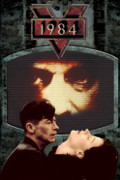
Directed by
Michael Radford
104 minutes
Rated M
Reviewed by
Bernard Hemingway


1984
Michael Radford’s adaptation of George Orwell’s dystopian novel set during April 1984 in post-atomic war London is a brilliant production at once suggesting a horrific future of Big Brother control and Orwell’s own experience (his novel was published in 1949), now well-gone, of the bleakness of post-WWII and pre-Cold War England. What it has going against it, albeit that it may be eminently appropriate, is its lugubrious pacing and unremitting drabness, aspects which make it a difficult film to endure.
Winston Smith (a perfectly cast John Hurt, who remarkably, was only 39 at the time) lives in bleak world of bombed-out buildings and squalid digs where ceaseless propaganda and constant surveillance ensure subservience to the State party, an amalgam of Nazi Germany and Stalinist Russia. Reflecting the motto that opens the film: “Who controls the past controls the future. Who controls the present controls the past” Winston himself works in the Ministry of Truth rewriting newspapers, erasing the past as required and implementing what today we would call “disinformation” as in the background endless war is used to justify State diktats and arouse popular support. Winston is beginning to doubt the Party line and when he is approached by an attractive young woman (Suzanna Hamilton), their brief affair constitutes an act of rebellion before Winston is entrapped by a high-ranking Party official, O'Brien (Richard Burton in his final film).
Reminiscent stylistically at times of Truffaut’s classic Farenheit 451 (the casting of Cyril Cusack, a clear acknowledgement thereof), both in terms of its marvellous production design and washed-out visuals of Roger Deakins cinematography and its dramatic force it is a much more telling allegory of the totalitarian State as well as a fine adaptation of Orwell’s cautionary novel.
FYI: Terry Gilliam and Tom Stoppard, presumably coincidentally, would release a brilliantly outlandish re-imagining of Orwell’s novel with Brazil the following year.
Want something different?





